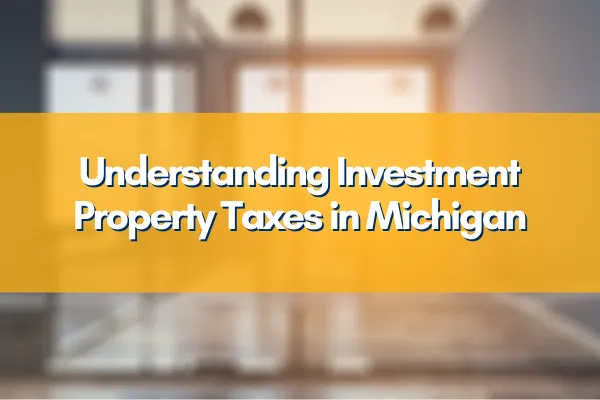
Understanding Investment Property Taxes in Michigan: A Guide to Tax Types for Real Estate Investors
Dan's Investment Series Part 4
Understanding Investment Property Taxes in Michigan A Guide for Real Estate Investors in Ann Arbor
If you’re considering adding rental properties or other investment real estate to your portfolio in Ann Arbor, Michigan, understanding the ins and outs of investment property taxes is crucial. It’s not just about acquiring a property but about doing so with a clear picture of the tax implications. That way, you can optimize your investment strategies and maximize your ROI.
In this guide, we’ll break down the key Michigan property tax types for investment properties, explore tax benefits for landlords, and share local insights to help you navigate Michigan real estate investment tax laws confidently.
Why Understanding Michigan Investment Property Taxes Matters
Michigan offers a vibrant real estate market with opportunities across single-family homes, multi-family apartments, commercial spaces, and condos. However, the tax landscape can seem complex. Knowing how investment property taxes work in Michigan lets you plan better, avoid surprises, and improve your overall investment return.
Michigan Property Tax Types for Investment Properties
Michigan categorizes property taxes primarily into several types, each affecting landlords and investors differently.
Real Property Taxes in Michigan
Most investment properties in Ann Arbor are subject to real property taxes. These include taxes on residential rental properties like multi-family units and condos, as well as commercial investments.
Michigan’s property tax rates are determined locally, with Ann Arbor’s rates reflecting the city’s municipal budget needs. As of 2023, the average Michigan property tax rate was approximately 56 mills—which translates to about 5.6% of the property's assessed value annually, although rates fluctuate regionally.
Capital Gains Tax and Its Impact
When you sell an investment property, Michigan capital gains tax applies, adding a layer of tax implications. Federal capital gains taxes are also relevant, with long-term gains taxed at favorable rates if held over a year. Being proactive about capital gains tax planning in Michigan can help you keep more of your profits.
Rental Income Tax in Michigan
Rental income derived from Michigan properties must be reported on your federal and state tax returns. Thankfully, deductions are available to offset taxable rental income, reducing your overall tax burden.
Key Tax Benefits for Michigan Landlords
Investors in Ann Arbor can leverage several tax deductions and benefits to reduce their taxable income. Common Michigan landlord tax deductions include:
Mortgage interest
Property management and maintenance costs
Property taxes
Depreciation of investment properties
Home office expenses related to property management
Depreciation, in particular, allows landlords to recover the cost of the property over time, providing a significant tax benefit.
Investment Property Depreciation in Michigan
Depreciation is a powerful tool. For residential rental properties, the IRS allows depreciation over 27.5 years. This means you can deduct a portion of the property's value annually, decreasing your taxable income. Understanding depreciation rules for Michgian investment properties enables strategic tax planning.
Michigan Real Estate Tax Strategies for Investors
In Ann Arbor, savvy investors adopt tax strategies tailored to local laws. These include:
Utilizing 1031 exchanges to defer capital gains taxes
Structuring investments through LLCs for liability and tax benefits
Maximizing deductions for repairs and improvements
Planning for the impact of Michigan’s property tax rates on cash flow
Implementing these strategies helps ensure you're making the most of your real estate investments.
Multi-Family and Condo Investment Property Taxes
Multi-family properties in Ann Arbor often benefit from economies of scale, but they also face specific tax considerations. For condos, owners often pay condo association fees, which are deductible if related to rental activities. Being aware of these nuances can enhance your tax planning.
Commercial and Residential Rental Property Tax Implications
Commercial investment properties attract different tax rules compared to residential rentals. Michigan provides specific tax benefits for commercial landlords, such as deductions for landlord improvements and equity investment strategies.
How Investment Property Taxes Work When Buying in Michigan
Upon purchasing a property, investors should consider the initial purchase’s tax implications, including transfer taxes and potential reassessments. It's essential to evaluate how the new property's tax rate fits into your overall investment return.
Local Market Insight: Ann Arbor’s Unique Tax Environment
Ann Arbor’s investment property taxes reflect its vibrant, university-driven economy. The city’s property tax rates are competitive yet carefully managed to support local infrastructure. Michigan’s property tax assessments are based on market value, so market fluctuations directly influence your tax bills. Staying informed about Ann Arbor’s tax rate trends helps investors optimize their portfolios.
Resources and Tools for Michigan Real Estate Investment Tax Planning
For in-depth guidance, I recommend reviewing this detailed Michigan property tax system overview. Additionally, partnering with a local expert like Dan DeCaupa can help tailor strategies specific to Ann Arbor’s market, ensuring you capitalize on all available tax benefits.
Final Thoughts
Investing in Michigan real estate offers promising opportunities. However, a solid understanding of investment property taxes in Michigan helps you keep more profits and stay compliant.
From property taxes and depreciation to capital gains and rental income taxes, knowing how these elements interact is key. Local market nuances in Ann Arbor mean that personalized advice can make a real difference.
If you're ready to explore investment properties or need tailored tax strategies, reach out to Dan DeCaupa today. I am here to support your real estate journey in Ann Arbor and beyond.
Contact Dan DeCaupa
Phone: 734-730-7061
Email: [email protected]
Website: spotlighthometeam.com





